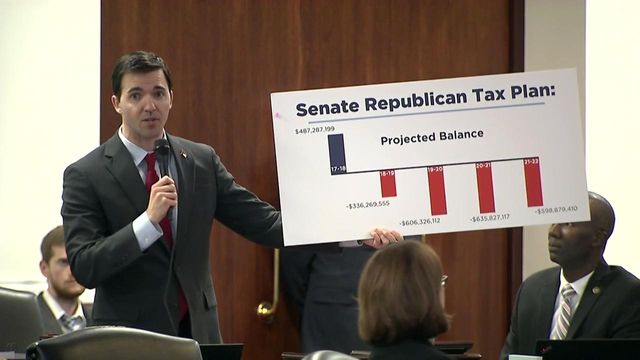Senate OKs spending plan in 3 am vote
A robust debate on the Senate's proposed $22.9 billion spending plan for 2017-18 on Thursday night turned into a bitter, sarcastic affair during a midnight session early Friday.
Posted — UpdatedIn the end, however, the chamber voted along party lines twice to approve the budget proposal and send it over to the House.
Republican Senate leaders who authored the measure say it continues their philosophy of restricted spending and tax cuts to which they credit the state's economic growth over the past several years. But Senate Democrats say it continues to underfund the state's core responsibilities, such as teacher pay and per-pupil spending.
The budget includes a small cut to the personal income tax rate, a more substantial increase in the standard deduction and a sizeable reduction in the corporate income tax rate, as well as reductions in the franchise tax that small businesses pay.
Senate budget chairman Sen. Harry Brown, R-Onslow, said the proposal "reduces the tax burden on North Carolina families and small businesses." But Democrats said the tax cut would benefit the wealthy and corporations more than the average family and argued the money would be better invested in education and economic and workforce development.
"We’ve seen many folks feel like they’ve been left behind in the recovery process. This budget before us doesn’t work for those families," argued Sen. Mike Woodard, D-Durham. "We can’t keep cooking up new schemes for the wealthy if want to meet our potential as a state."
"This is like putting a $600 million hole in the budget. It’s fiscally irresponsible," agreed Sen. Floyd McKissick, D-Durham. "It's just a billionaire's budget."
Republican leaders took umbrage at that label.
Sen. Tommy Tucker, R-Union, said those that pay more taxes would naturally get more back as a result of a percentage cut. But, he added, the increase to the standard deduction will mean that 94,000 more North Carolinians will owe no state income tax at all.
"I assure each and every one of you, they are not billionaires," he said.
Tucker pointed to the state's high rankings in business magazines as evidence that the GOP tax cut strategy has succeeded.
"It’s all not doom and gloom like you say it is," he told McKissick. "I think North Carolinians feel good about where North Carolina is."
Senate Minority Leader Dan Blue added that the tax cuts for working families will be tiny and argued that most working parents would rather see the money invested in better education for their children. But, he said, the budget merely preserves the status quo.
"We place too much emphasis in this budget on issues regarding people who sit around boardrooms and board tables," said Blue, D-Wake. "The discussion is about how we're affecting people's conversations around their dinner tables."
Late-night legislating
Democrats didn't offer a single amendment to the budget bill during the Thursday evening debate, but they unleashed a fusillade in the wee hours of Friday before the final vote.
Sen. Paul Lowe, D-Forsyth, and McKissick tried to eliminate the tax cut for wealthy individuals to generate more money that could be used to fight the opioid addiction crisis or to implement the teacher salary schedule in Gov. Roy Cooper's proposed budget, but Sen. Bill Rabon, R-Brunswick, used parliamentary maneuvers to kill the amendments.
Rabon then offered his own amendment to revert all state tax rates to 2009 levels.
"That's what you said made us all happy and so well," Rabon dryly told Senate Democrats. "I could not go home and sleep and live with myself tomorrow if I did not give you the chance to get what you want."
That amendment failed 5-43.
Tax changes weren't the only Democratic efforts to alter the budget that were blocked by the Republican majority:
- Sen. Joyce Waddell, D-Mecklenburg, tried to insert a 2 percent cost-of-living adjustment for state retirees by cutting the $363 million the budget deposits into the "rainy day" reserve fund almost in half.
- Sen. Erica Smith-Ingram, D-Northampton, tried to shift money from the film production grant fund to provide more support for expanding broadband service in rural counties.
- Sen. Gladys Robinson, D-Guilford, tried to cut money from the Opportunity Scholarships school voucher program to fund a community college scholarship program Cooper proposed.
After about a half-hour debate on the bill, Rabon called for a recess until 2:30 a.m. A few sleepy-sounding "ayes" supported the motion, and Senate President Pro Tem Phil Berger quickly announced it approved after giving practically no time for anyone to register opposition.
Senators finally returned about 2:45 a.m. and took up a non-controversial bill instead before breaking again. A final vote on the budget didn't come until after 3 a.m.
While Democrats touted the budget proposal advanced by Cooper in March, Republicans faulted it for excessive spending.
"How many tax increases did Gov. Cooper vote for when he was here in this chamber?" Sen. Jerry Tillman, R-Randolph, asked during the evening debate, referring to Cooper's tenure as a state senator in the 1990s. "Here’s a hint: All of them."
Berger chalked up the Democrats' debate to differences in philosophy.
"It still sounds to me like 'spend more, tax more,'" he said.
"There is no question that the initiative and the policies that have been adopted over the last six years have been successful," Berger said. "Are they perfect? I don't think anything's perfect. But they're a vast improvement over where we were in 2010."
Related Topics
• Credits
Copyright 2024 by Capitol Broadcasting Company. All rights reserved. This material may not be published, broadcast, rewritten or redistributed.





